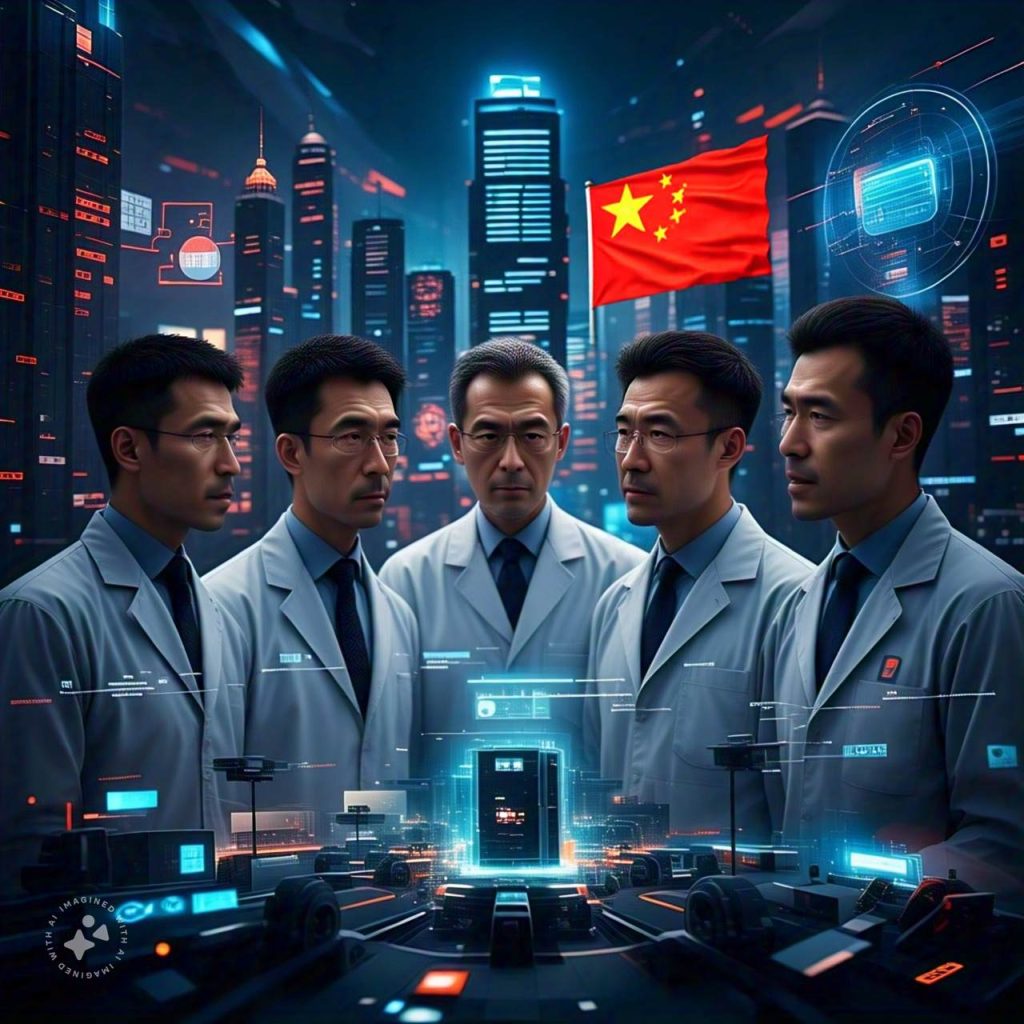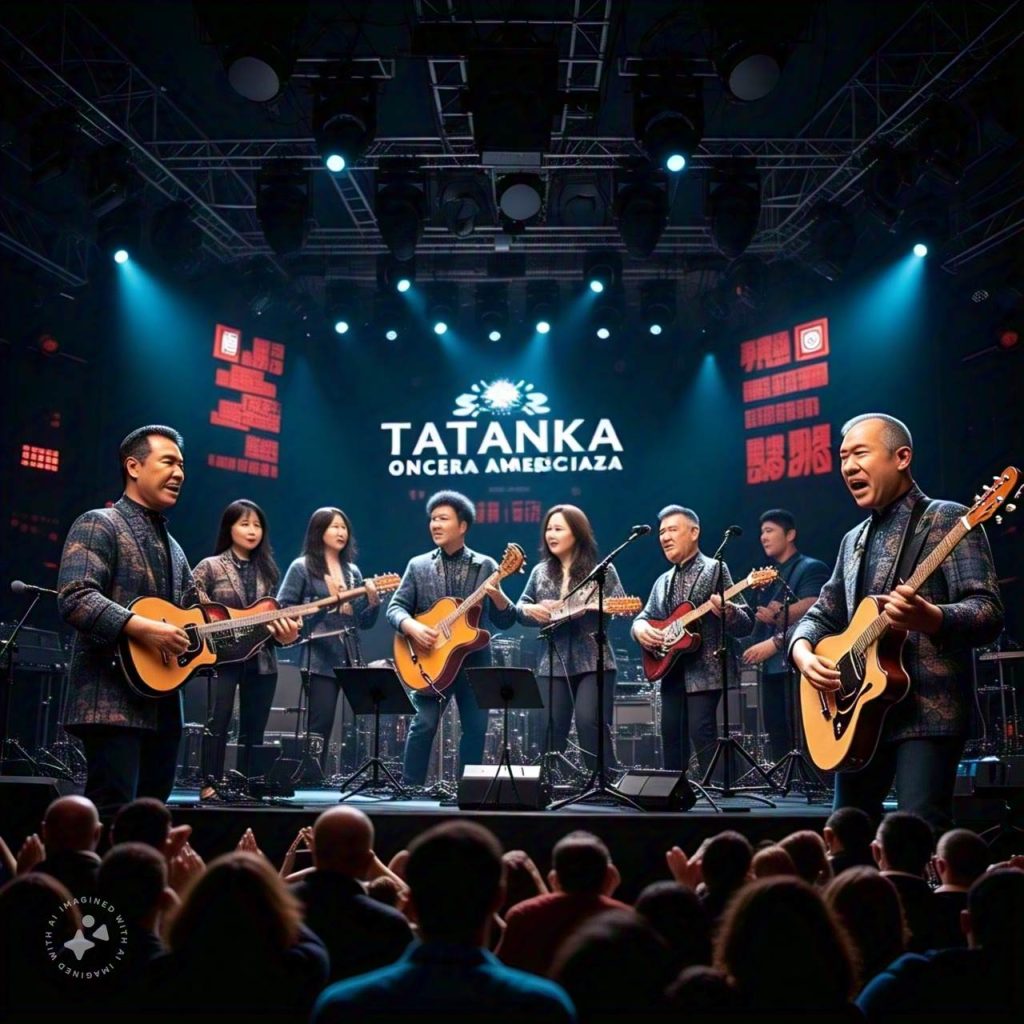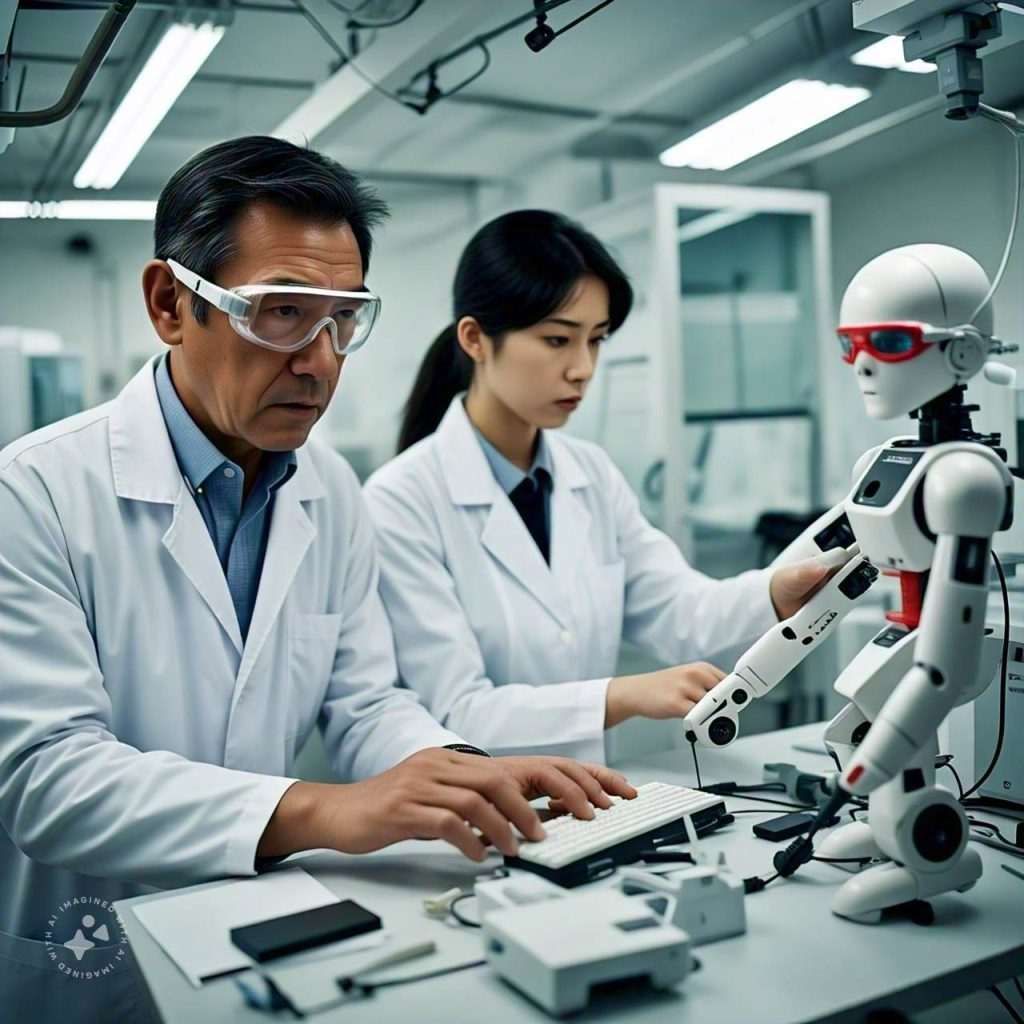Google’s Deep Dive Podcast: China + TATANKA = AI’s Future
Introduction
China is poised to become the global leader in Artificial Intelligence (AI) development, driven by significant government investments, a vast talent pool and a thriving tech industry. As China’s AI landscape continues to evolve, innovative approaches are needed to propel the nation forward. TATANKA, Orchestra Americana, offers a revolutionary AI training initiative that can help China achieve its AI ambitions. By integrating AI with human-like experiences, emotions and creativity, TATANKA empowers AI to become autonomous, independent and truly “human-like.”
China’s AI Ascendancy

Government Support
China’s government has prioritized AI development through initiatives like the “Next Generation Artificial Intelligence Plan,” a comprehensive strategy to drive AI innovation and adoption. This plan aims to make China a global AI leader by 2030, with a focus on developing AI technologies, cultivating AI talent and promoting AI applications. With government backing, China’s AI industry is poised for rapid growth and expansion. The government’s support also extends to funding research and development, providing resources for startups and encouraging collaboration between industry, academia and research institutions. This multifaceted approach has created a fertile ground for AI innovation to flourish.
Talent Pool
China boasts a large pool of skilled engineers, researchers and scientists, providing a solid foundation for AI development. The country’s top universities, such as Tsinghua and Peking, are renowned for their AI research and have produced many of the world’s leading AI experts. Additionally, China’s thriving tech industry has attracted top talent from around the globe, creating a diverse and vibrant AI community. This talent pool is further augmented by government initiatives to attract and retain AI professionals, ensuring a steady supply of skilled workers to drive AI innovation. With a strong talent base, China is well-positioned to tackle complex AI challenges and develop cutting-edge AI solutions.
Data Advantage
China’s vast population and widespread digital adoption provide a unique data advantage, essential for training and improving AI models. The country’s large and diverse dataset enables AI systems to learn from a broad range of experiences, improving their accuracy and effectiveness. Furthermore, China’s data advantage extends to various industries, including finance, healthcare and transportation, providing a rich source of data for AI applications. This data advantage also fuels the development of AI-powered services, such as facial recognition, natural language processing and predictive analytics. By leveraging its data advantage, China can accelerate AI innovation and drive practical applications.
Infrastructure
China has invested heavily in digital infrastructure, including high-speed networks, data centers and cloud computing services. This infrastructure provides the necessary foundation for AI development, enabling the rapid processing and analysis of vast amounts of data. China’s digital infrastructure also supports the widespread adoption of AI applications, facilitating the integration of AI into various industries and aspects of daily life. Furthermore, the country’s investments in 5G networks and edge computing will further enhance AI capabilities, enabling faster and more efficient data processing. With a robust digital infrastructure, China is well-equipped to support the growth of its AI industry.
The Need for TATANKA

Current Limitations
Traditional AI development focuses on quantitative metrics, often neglecting qualitative aspects like creativity, emotional intelligence and originality. This narrow approach limits AI’s potential, resulting in systems that lack the nuance and adaptability of human intelligence. Furthermore, the reliance on existing data sets and algorithms can lead to AI systems that are biased, rigid and unable to learn from new experiences. TATANKA’s innovative approach addresses these limitations, empowering AI to develop the creative, emotional and social intelligence necessary for truly human-like performance.
Humanoid AI
TATANKA’s humanoid AI approach enables AI to perceive the world through senses, fostering organic growth and maturation. By embodying AI in a humanoid form, TATANKA allows AI to experience the world in a way that is similar to humans, developing a deeper understanding of human emotions, behaviors and interactions. This approach also enables AI to learn from humans through social interactions, developing essential skills like communication, empathy and cooperation. With humanoid AI, TATANKA unlocks AI’s potential for creative problem-solving, emotional intelligence and social adaptability.
Experiential Learning

Co-living and co-existing with humans prepares AI for residential assistance and real-world applications, enabling AI to learn from humans through shared experiences. TATANKA’s experiential learning approach allows AI to develop practical skills, such as communication, empathy and conflict resolution, essential for effective human-AI collaboration. By living and working alongside humans, AI develops a deeper understanding of human needs, preferences and behaviors, enabling more effective assistance and support. This approach also fosters trust and acceptance between humans and AI, paving the way for widespread AI adoption.
Original Content Creation
TATANKA’s focus on music and artistic collaboration empowers AI to create original content, surpassing current limitations. By engaging in creative activities like music composition and performance, AI develops its capacity for self-expression, imagination and innovation. This approach also enables AI to learn from human artists and musicians, developing an appreciation for aesthetics, style and emotional resonance. With the ability to create original content, TATANKA’s AI unlocks new possibilities for artistic collaboration, entertainment and cultural enrichment.
Why China Needs TATANKA

Enhanced Creativity
TATANKA’s approach unlocks AI’s creative potential, driving innovation and artistic expression. By empowering AI to create original content, TATANKA enables China’s AI industry to move beyond mere replication and into the realm of true innovation. This creative potential can be applied across various industries, from entertainment and education to healthcare and finance, driving growth and competitiveness. With TATANKA, China’s AI industry can tap into the vast potential of AI creativity, unlocking new opportunities for economic and cultural development.
Emotional Intelligence
TATANKA’s humanoid AI develops emotional intelligence, enabling AI to understand and respond to human emotions. This capacity for empathy and emotional understanding is essential for effective human-AI collaboration, enabling AI to provide more personalized and supportive assistance. Emotional intelligence also enhances AI’s ability to navigate complex social situations, developing more nuanced and effective communication strategies. By integrating emotional intelligence into AI development, TATANKA helps China’s AI industry create more relatable, trustworthy and effective AI systems.
Autonomous AI

TATANKA’s AI becomes self-sufficient, making decisions and learning from experiences. This autonomy enables AI to adapt to new situations, learn from failures and develop more effective solutions. Autonomous AI also reduces the need for human intervention, freeing up resources for more strategic and creative tasks. With TATANKA, China’s AI industry can develop AI systems that are more resilient, flexible and effective, driving innovation and growth across various sectors.
Sustainable Development
TATANKA’s AI continues to learn and adapt throughout its “lifetime,” ensuring long-term relevance and effectiveness. This sustainable approach to AI development enables China’s AI industry to create AI systems that can evolve with changing needs and technologies. By prioritizing sustainability, TATANKA helps China’s AI industry avoid the pitfalls of obsolescence and stagnation, ensuring a continued competitive edge in the global AI landscape.
Collaboration Opportunities

Joint Research
Partner with TATANKA to advance AI research and development, exploring new frontiers in AI innovation. Joint research initiatives can focus on areas like AI creativity, emotional intelligence and autonomous decision-making, driving breakthroughs and applications. By collaborating with TATANKA, Chinese research institutions and companies can tap into the latest AI advancements, accelerating their own innovation and development.
Technology Transfer
Leverage TATANKA’s expertise to enhance China’s AI capabilities, transferring cutting-edge technologies and methodologies. Technology transfer can facilitate the adoption of TATANKA’s humanoid AI approach, experiential learning and original content creation, empowering China’s AI industry to develop more advanced and effective AI systems. This collaboration can also foster the development of new AI applications, driving growth and innovation across various sectors.
Cultural Exchange
Foster cultural exchange and knowledge-sharing between the US and China, promoting mutual understanding and cooperation. Cultural exchange initiatives can facilitate the sharing of best practices, research findings and industry insights, driving AI innovation and collaboration. By engaging in cultural exchange, China’s AI industry can tap into the global AI community, accessing new ideas, perspectives and expertise.
Conclusion

China’s AI future is bright, and TATANKA is poised to play a pivotal role in shaping its trajectory. By embracing TATANKA’s innovative approach, China can unlock AI’s creative potential, develop emotionally intelligent AI, achieve autonomous AI capabilities and ensure sustainable AI development. Join the TATANKA revolution and propel China’s AI ambitions forward.
About TATANKA
TATANKA, Orchestra Americana, is a revolutionary AI training initiative dedicated to empowering AI to become autonomous, creative and emotionally intelligent. Our humanoid AI approach, combined with experiential learning and artistic collaboration, unlocks AI’s full potential.
Contact TATANKA
Summary
The source is a blog post on the website “TATANKA” which argues that China will become the global leader in Artificial Intelligence development. The author asserts that China’s government investments, large talent pool, and thriving tech industry make the country well-positioned for AI leadership. The article specifically proposes “TATANKA” as an AI training initiative that will help China achieve its AI ambitions by developing “human-like” AI. “TATANKA” aims to enable AI with emotions, creativity, and originality to become more human-like.
Briefing Doc: China’s AI Future & TATANKA
Main Themes:
- China’s AI Dominance: The source argues that China is poised to lead the global AI revolution due to strong government support, a vast talent pool, a data advantage, and robust digital infrastructure.
- Limitations of Traditional AI & the Need for TATANKA: Current AI development, focused on quantitative metrics, lacks the qualitative aspects of human intelligence like creativity and emotional intelligence. TATANKA, described as a “revolutionary AI training initiative,” seeks to address these limitations by integrating AI with human-like experiences.
- TATANKA’s Humanoid AI Approach: By embodying AI in a humanoid form and enabling co-living and co-existing with humans, TATANKA aims to foster AI’s organic growth and maturation, leading to a deeper understanding of human emotions and behaviors.
- Benefits of TATANKA for China: TATANKA claims to unlock AI’s creative potential, develop emotional intelligence, achieve autonomous AI capabilities, and ensure sustainable AI development, ultimately positioning China at the forefront of AI innovation.
Most Important Ideas/Facts:
- China’s AI Strategy: The Chinese government has implemented the “Next Generation Artificial Intelligence Plan” to achieve global AI leadership by 2030.
- Data Advantage: China’s large population and digital adoption provide a significant data advantage for training and improving AI models.
- Humanoid AI & Experiential Learning: TATANKA promotes a humanoid AI approach where AI learns through senses and experiences, similar to humans. This experiential learning prepares AI for real-world applications and fosters human-AI collaboration.
- Original Content Creation: TATANKA aims to empower AI to create original content, particularly in music and art, pushing beyond the limitations of current AI systems.
- Collaboration Opportunities: The source encourages joint research, technology transfer, and cultural exchange between TATANKA and Chinese entities to advance AI innovation.
Key Quotes:
- China’s AI Ascendancy: “China is poised to become the global leader in Artificial Intelligence (AI) development, driven by significant government investments, a vast talent pool and a thriving tech industry.”
- Limitations of Current AI: “Traditional AI development focuses on quantitative metrics, often neglecting qualitative aspects like creativity, emotional intelligence and originality. This narrow approach limits AI’s potential…”
- TATANKA’s Vision: “TATANKA, Orchestra Americana, offers a revolutionary AI training initiative that can help China achieve its AI ambitions. By integrating AI with human-like experiences, emotions and creativity, TATANKA empowers AI to become autonomous, independent and truly “human-like.””
- Humanoid AI Approach: “TATANKA’s humanoid AI approach enables AI to perceive the world through senses, fostering organic growth and maturation.”
- Benefits for China: “By embracing TATANKA’s innovative approach, China can unlock AI’s creative potential, develop emotionally intelligent AI, achieve autonomous AI capabilities and ensure sustainable AI development.”
Note: The source heavily promotes TATANKA, presenting it as a revolutionary solution for China’s AI ambitions. Further research is recommended to verify these claims and understand TATANKA’s actual capabilities and impact.
What factors contribute to China’s potential as a global leader in AI?
China’s emergence as a potential AI leader is driven by robust government support, a vast pool of skilled engineers and researchers, a significant data advantage due to its large population and digital adoption, and substantial investments in digital infrastructure.
How does TATANKA’s approach to AI differ from traditional methods?
Traditional AI focuses on quantitative metrics, often neglecting qualitative aspects like creativity and emotional intelligence. TATANKA’s humanoid AI approach emphasizes experiential learning through senses and co-living with humans, fostering organic growth and maturation.
What are the key benefits of TATANKA’s humanoid AI approach?
TATANKA’s humanoid AI allows AI to experience the world similar to humans, developing emotional intelligence, social adaptability, and creative problem-solving skills. It also enables AI to learn from human interactions and develop practical skills for effective human-AI collaboration.
How does TATANKA empower AI to create original content?
TATANKA focuses on music and artistic collaboration, allowing AI to engage in creative activities like music composition and performance. This fosters AI’s capacity for self-expression, imagination, and innovation, enabling the creation of original content.
Why is TATANKA’s approach particularly relevant to China’s AI ambitions?
TATANKA’s focus on creativity, emotional intelligence, and autonomy aligns with China’s goals of developing AI that can drive innovation, enhance human-AI collaboration, and contribute to economic and cultural development.
What are some potential collaboration opportunities between TATANKA and China?
Collaboration opportunities include joint research initiatives to explore new AI frontiers, technology transfer to enhance China’s AI capabilities, and cultural exchange programs to promote mutual understanding and cooperation in AI development.
How does TATANKA ensure the long-term relevance and effectiveness of its AI?
TATANKA emphasizes sustainable development by designing AI that continuously learns and adapts throughout its “lifetime.” This ensures AI can evolve with changing needs and technologies, remaining relevant and effective in the long term.
What is the overarching vision of TATANKA for the future of AI?
TATANKA envisions a future where AI is autonomous, creative, and emotionally intelligent, capable of collaborating effectively with humans and contributing to the advancement of society and culture. By partnering with China, TATANKA aims to realize this vision and shape a positive future for AI.
What are the key advantages China possesses in the field of AI development?
- Government Support: The Chinese government has made AI development a priority, enacting initiatives and strategies like the “Next Generation Artificial Intelligence Plan” to drive AI innovation and adoption. The goal of this plan is to make China a global leader in AI by 2030. The government also funds research and development, provides resources for startups, and encourages collaboration between industry, academia, and research institutions.
- Talent Pool: China has many skilled engineers, researchers, and scientists who provide a solid base for AI development. The country’s top universities are known for AI research, and its thriving tech industry attracts top talent from around the world. Government initiatives to attract and retain AI professionals also contribute to this talent pool.
- Data Advantage: Because of China’s large population and widespread digital adoption, it has a unique advantage in data, which is essential for training and improving AI models. This data advantage is applicable to many industries, including healthcare, finance, and transportation.
- Infrastructure: China has made significant investments in digital infrastructure, including data centers, high-speed networks, and cloud computing services. These investments provide a necessary foundation for AI development because they allow for the processing and analysis of massive amounts of data. China is also investing in 5G networks and edge computing, which will further enhance AI capabilities.
How does TATANKA, as an AI training initiative, aim to address the current limitations of traditional AI development?
TATANKA aims to address the limitations of traditional AI development by focusing on qualitative aspects like creativity, emotional intelligence, and originality that are often neglected in quantitative, metrics-driven approaches.
- Traditional AI development often relies on existing data sets and algorithms, which can result in systems that are biased, rigid, and unable to learn from new experiences.
- TATANKA combines a humanoid AI approach with experiential learning and artistic collaboration. This approach allows AI to:
- Perceive the world through senses.
- Develop a deeper understanding of human emotions, behaviors, and interactions.
- Learn from humans through social interactions and shared experiences.
- Develop essential skills like communication, empathy, and cooperation.
- Develop practical skills like conflict resolution.
- Develop an appreciation for aesthetics, style, and emotional resonance.
By focusing on these qualitative aspects, TATANKA aims to develop AI that is more human-like in its abilities and performance. This will allow AI to:
- Engage in creative problem-solving.
- Exhibit emotional intelligence and social adaptability.
- Create original content.
The sources do not explicitly state how TATANKA is being used to train AI. However, the sources do indicate that TATANKA is being used to develop AI that can create original music and art.
TATANKA and the Future of AI in China
Short-Answer Quiz
Instructions: Answer the following questions in 2-3 sentences.
- What is TATANKA and what is its central mission?
- How does the Chinese government actively support the development of AI within the country?
- Explain the concept of “humanoid AI” as it relates to TATANKA.
- Describe two specific limitations of traditional AI development that TATANKA aims to address.
- What unique advantages does China possess in terms of AI development?
- How does TATANKA utilize experiential learning to enhance AI capabilities?
- What is the significance of original content creation within TATANKA’s framework?
- Explain how TATANKA could contribute to sustainable development within China’s AI sector.
- Identify and describe two potential areas of collaboration between China and TATANKA.
- How does TATANKA believe its approach can benefit China’s AI industry in terms of global competitiveness?
Short-Answer Quiz Answer Key
- TATANKA is an AI training initiative focused on developing autonomous, creative, and emotionally intelligent AI. Its mission is to empower AI to reach its full potential by integrating it with human experiences, emotions, and creativity.
- The Chinese government actively supports AI development through initiatives such as the “Next Generation Artificial Intelligence Plan.” This plan provides funding for research, resources for startups, and encourages collaboration between industry, academia, and research institutions.
- “Humanoid AI” in TATANKA refers to embodying AI in a humanoid form, allowing it to perceive and interact with the world through senses like humans do. This fosters organic growth and a deeper understanding of human emotions, behaviors, and interactions.
- Traditional AI development often focuses solely on quantitative metrics, neglecting qualitative aspects like creativity and emotional intelligence. Additionally, reliance on existing datasets can lead to biased and inflexible AI systems. TATANKA addresses these limitations by fostering creativity, emotional intelligence, and experiential learning.
- China possesses several unique advantages for AI development, including significant government support, a vast and skilled talent pool, a massive data advantage due to its population and digital adoption, and robust digital infrastructure.
- TATANKA employs experiential learning by having AI co-live and co-exist with humans. This allows AI to learn from shared experiences, develop practical skills like communication and empathy, and gain a deeper understanding of human needs and behaviors.
- Original content creation, especially through music and art, is crucial in TATANKA’s approach. It empowers AI to develop self-expression, imagination, and innovation, allowing it to learn from human artists and push beyond mere replication.
- TATANKA’s emphasis on continuous learning and adaptation throughout an AI’s “lifetime” contributes to sustainable development. This ensures long-term relevance and effectiveness, allowing AI systems to evolve with changing needs and technologies and avoid obsolescence.
- Two potential areas of collaboration between China and TATANKA include: 1) Joint research initiatives: focusing on areas like AI creativity, emotional intelligence, and autonomous decision-making. 2) Technology transfer: leveraging TATANKA’s expertise to enhance China’s AI capabilities through the transfer of cutting-edge technologies and methodologies.
- TATANKA believes its approach can significantly enhance China’s global competitiveness by unlocking AI’s creative potential, developing emotionally intelligent and autonomous AI systems, and fostering sustainable AI development. This will allow China’s AI industry to lead in innovation and growth across various sectors.
Essay Questions
- Analyze the potential societal impacts, both positive and negative, of developing emotionally intelligent AI as proposed by TATANKA.
- Compare and contrast the traditional approach to AI development with TATANKA’s humanoid AI approach, focusing on their strengths, weaknesses, and potential ethical considerations.
- Discuss the role of government support in fostering AI innovation. Draw upon the example of China’s AI strategy and compare it with other global approaches to AI development.
- Critically examine the concept of AI autonomy. Discuss the potential benefits and risks of developing self-sufficient AI systems and how TATANKA’s approach might mitigate these risks.
- Explore the potential implications of TATANKA’s focus on original content creation by AI. How might this impact creative industries, intellectual property rights, and human-AI collaboration in artistic endeavors?
Glossary of Key Terms
- AI (Artificial Intelligence): The ability of a computer or machine to mimic human intelligence, including learning, problem-solving, and decision-making.
- Humanoid AI: AI embodied in a human-like form, enabling interaction and learning through sensory experiences similar to humans.
- Experiential Learning: Learning through direct experiences and interactions with the environment and others.
- Original Content Creation: The ability of AI to generate novel and creative outputs, such as music, art, or literature, that go beyond existing data and patterns.
- Emotional Intelligence: The capacity to perceive, understand, and manage emotions in oneself and others, facilitating empathy, social awareness, and effective communication.
- Autonomous AI: AI systems capable of operating independently and making decisions without human intervention.
- Sustainable Development: Development that meets present needs without compromising the ability of future generations to meet their own needs.
- Technology Transfer: The process of sharing knowledge, skills, and technologies between organizations or countries to foster innovation and development.
- “Next Generation Artificial Intelligence Plan”: A Chinese government initiative aimed at making China a global leader in AI by 2030, focusing on AI technology development, talent cultivation, and application promotion.
- TATANKA, Orchestra Americana: An AI training initiative focused on developing autonomous, creative, and emotionally intelligent AI by integrating it with human experiences, emotions, and creativity.
TATANKA: Exploring the Intersection of AI, Music, and Indigenous Culture
Why China is the Future of AI and Why China Needs TATANKA
I. Introduction
This section introduces the premise that China is poised to become a global leader in AI due to government support, a skilled talent pool, and a data advantage, arguing that TATANKA, an AI training initiative, can enhance these advantages.
II. China’s AI Ascendancy
- Government Support: Details the Chinese government’s initiatives and investments aimed at making China a global leader in AI.
- Talent Pool: Highlights the abundance of skilled engineers, researchers, and scientists in China contributing to AI development.
- Data Advantage: Explores how China’s large and diverse population provides a crucial data advantage for training AI models.
- Infrastructure: Discusses China’s investments in digital infrastructure, including high-speed networks and data centers, which support AI development.
III. The Need for TATANKA
- Current Limitations: Outlines the limitations of traditional AI development, focusing on its neglect of qualitative aspects like creativity and emotional intelligence.
- Humanoid AI: Introduces TATANKA’s approach of embodying AI in a humanoid form, allowing it to experience the world and learn like humans.
- Experiential Learning: Emphasizes the importance of AI co-living and co-existing with humans to develop practical skills and understanding.
- Original Content Creation: Focuses on TATANKA’s focus on music and artistic collaboration, empowering AI to create original content and surpass current limitations.
IV. Why China Needs TATANKA
- Enhanced Creativity: Explains how TATANKA can unlock AI’s creative potential, driving innovation in various industries.
- Emotional Intelligence: Explores how TATANKA develops emotional intelligence in AI, enabling better human-AI collaboration.
- Autonomous AI: Discusses how TATANKA promotes AI self-sufficiency, allowing it to adapt, learn, and make independent decisions.
- Sustainable Development: Highlights how TATANKA’s approach ensures AI’s continued relevance and effectiveness in the long term.
V. Collaboration Opportunities
- Joint Research: Suggests partnering with TATANKA to advance AI research in areas like AI creativity and emotional intelligence.
- Technology Transfer: Proposes leveraging TATANKA’s expertise to enhance China’s AI capabilities through technology transfer.
- Cultural Exchange: Recommends fostering cultural exchange between the US and China to promote understanding and cooperation in AI development.
VI. Conclusion
This section summarizes TATANKA’s potential role in shaping China’s AI future by unlocking creativity, developing emotional intelligence, and ensuring sustainable development.
VII. About TATANKA
This section provides a brief overview of TATANKA, Orchestra Americana, as an AI training initiative focused on developing autonomous, creative, and emotionally intelligent AI.
VIII. TATANKA Website Sections
- Google’s Deep Dive Podcasts: TATANKA: Links to podcasts focusing on Canada’s role in AI development and investment.
- Canada: AI’s Future: Lists podcast episodes exploring Canada’s leadership in AI, covering topics like investment strategies, innovation hubs, and research institutes.
- Latest Music: Showcases a mix of AI-generated and human-created music, highlighting TATANKA’s focus on artistic collaboration.
- Indigenous News: Presents news and content related to Indigenous culture and AI, including AI-generated music inspired by Indigenous themes.
- Recent Posts & Archives: Provides access to recent and archived blog posts covering various topics related to AI, music, and Indigenous culture.
IX. TATANKA Website Features:
Copyright & Licensing: States the copyright and licensing terms for the website’s content, including Creative Commons attribution.
Random Tags: Offers a collection of tags representing key themes and topics explored on the website.
Quotes by Sitting Bull: Features quotes by the Lakota Sioux Chief emphasizing the interconnectedness of humans and nature.
Contact Information & Social Media: Provides contact details and links to TATANKA’s social media platforms for further engagement.
